
Tanatap环形花园咖啡厅/ RAD+ar (Research Artistic Design + architecture)
Tanatap Ring Garden Coffee Shop / RAD+ar (Research Artistic Design + architecture)
由专筑网沈,小R编译
Tanatap环形花园咖啡厅是一处层次丰富的绿意空间,拥有起伏有致的活力平台和可以漫步其间的屋顶景观。互连的结构绿意环绕,热带户外活动打造圆形城市生活剧场。
Ring Garden Café called Tanatap is a small prototype of a multi-leveled greenspace with dynamic platforms that rise and fall to create a walkable roofscape. The structure will be connected to create a series of floating amphitheaters surrounding green spaces and tropical outdoor activities in the middle.
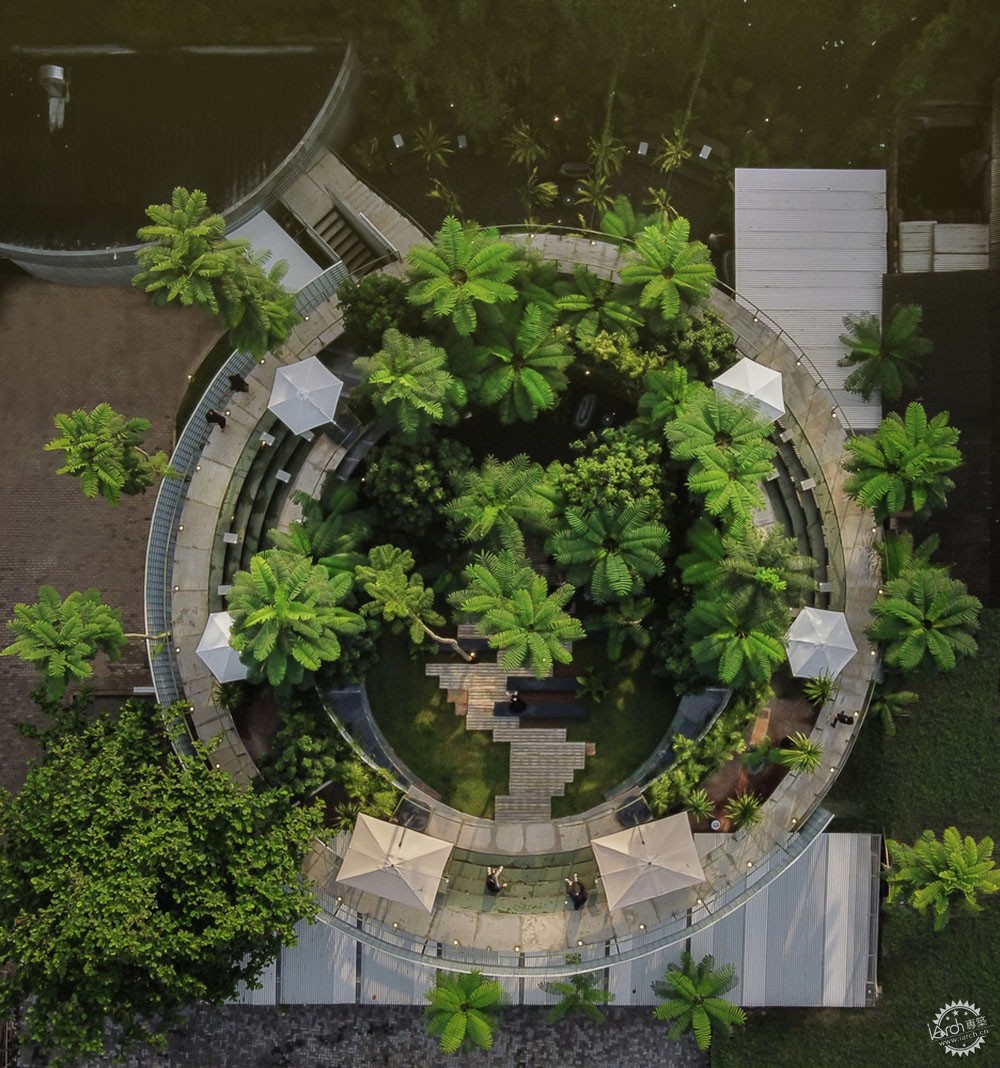
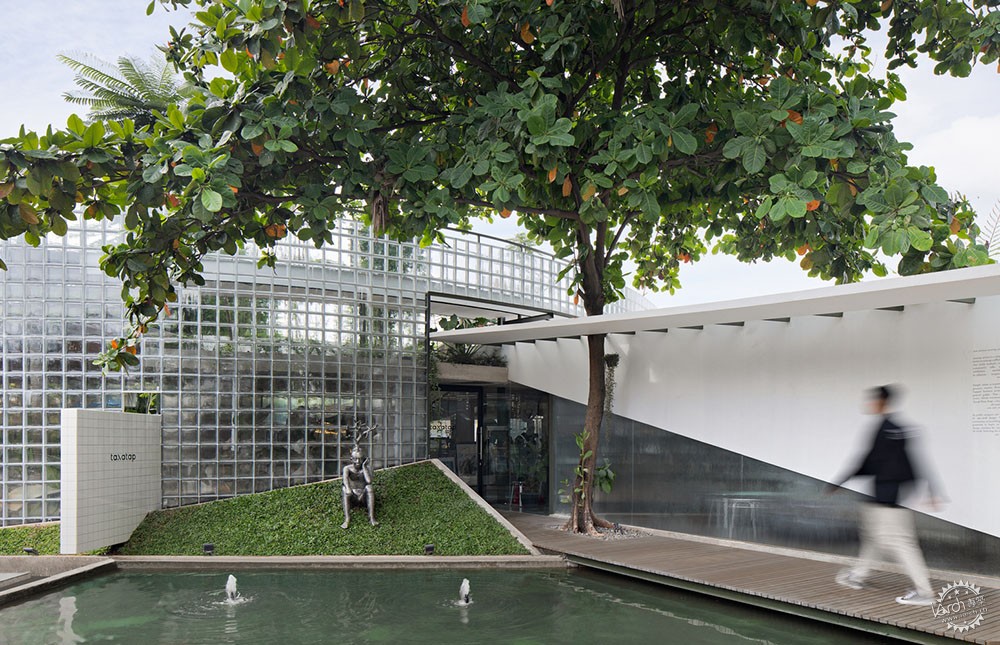
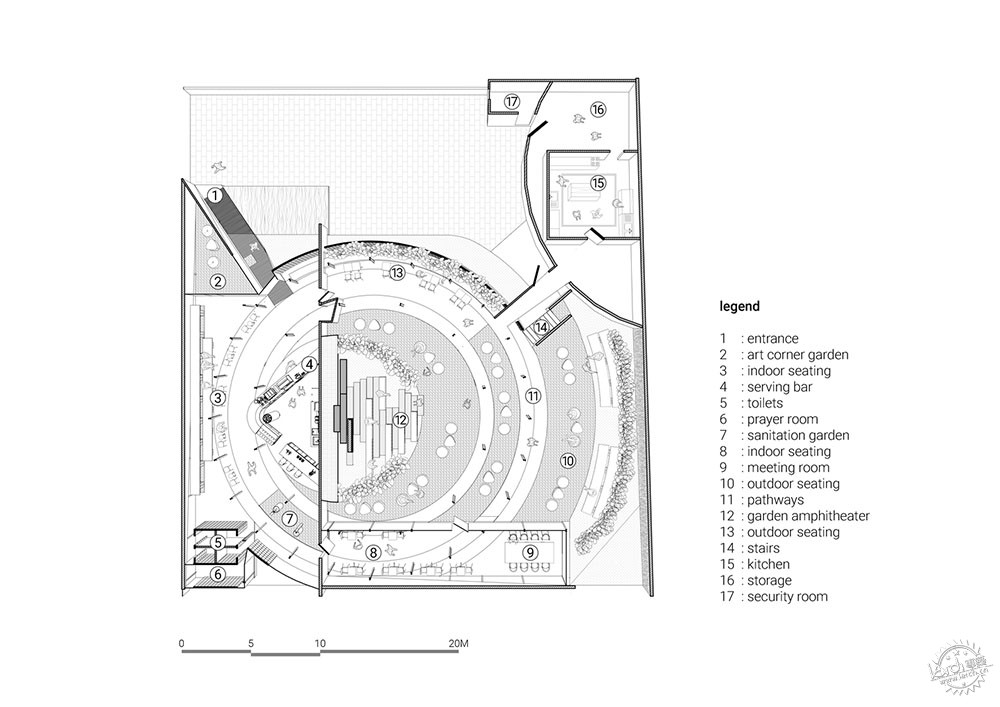
如果功能空间以及建筑的定义仅仅作为开放花园的外壳,那么会怎么样呢?设计旨在展示一处消解于简单多层花园中的室内空间。它是连续的,而不是一尘不变的。核心在于与自然、与人趣味盎然地共处。建筑师想将它设计成可持续的新兴城市活力空间,因为对于像雅加达这样的发展中国家城市,往往政府运营的公共空间都不可信赖。
Started with the question, what if functional spaces and the very definition of the building only acted as an envelope of an open garden. The design was to demonstrate a disappearing indoor space, hidden within a simple multi-leveled garden. Spaces that were created became a sequential space and were not an initial space. At the heart of our project is the idea of playful togetherness. We want this to be a refreshing and dynamic new civic space that is sustainable – businesswise in developing country cities like Jakarta, where government-run public space is unreliable.
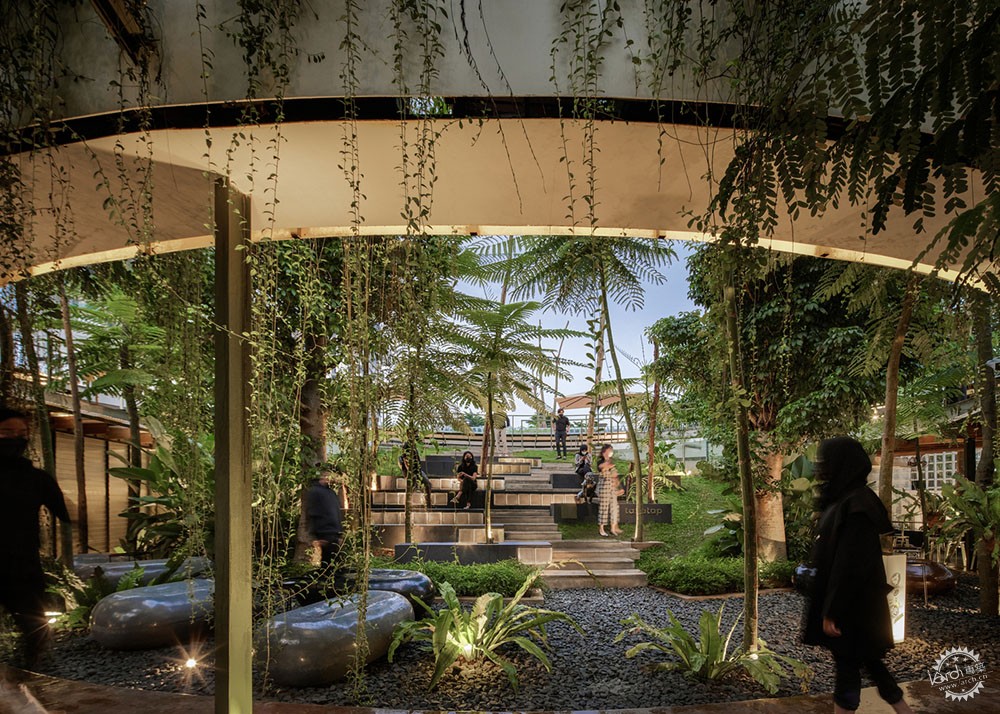

建筑师采取了三条策略打造这座自然中的多合一咖啡厅。首先,将场地现有的树木串联起来,形成游客的参观流线;其次,利用结构相互搭接创造主入口处地下的亲人尺度;第三,在尺度、色彩、植物密度和穿透大厅/酒吧的光线强度方面制造强烈的反差感。利用这种动态的手法处理现有景观环境,保证了新景观与花园浑然一体。
The architects developed three strategies to create a functional integrated cafe space within nature. The first approach is to connect all the existing trees as means of circulation for the visitor. Secondly, stringing all the structures to create an underground intimate scale experience in the main entrance. Next, is to create a contrast experience in scale, color, the density of nature, and the amount of natural sunlight penetration hidden in conceal doors in both wings in the lobby/bar area. This dynamic intervention into the existing landscape ensures that the new landscape intervention performs aesthetically in harmony with the garden as a whole.
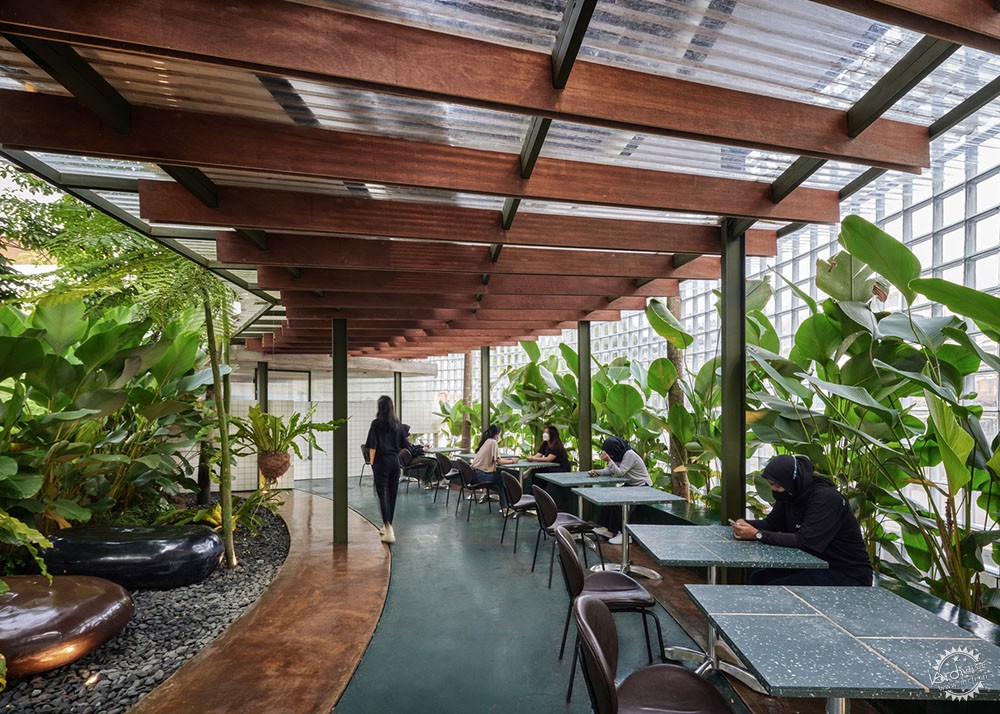
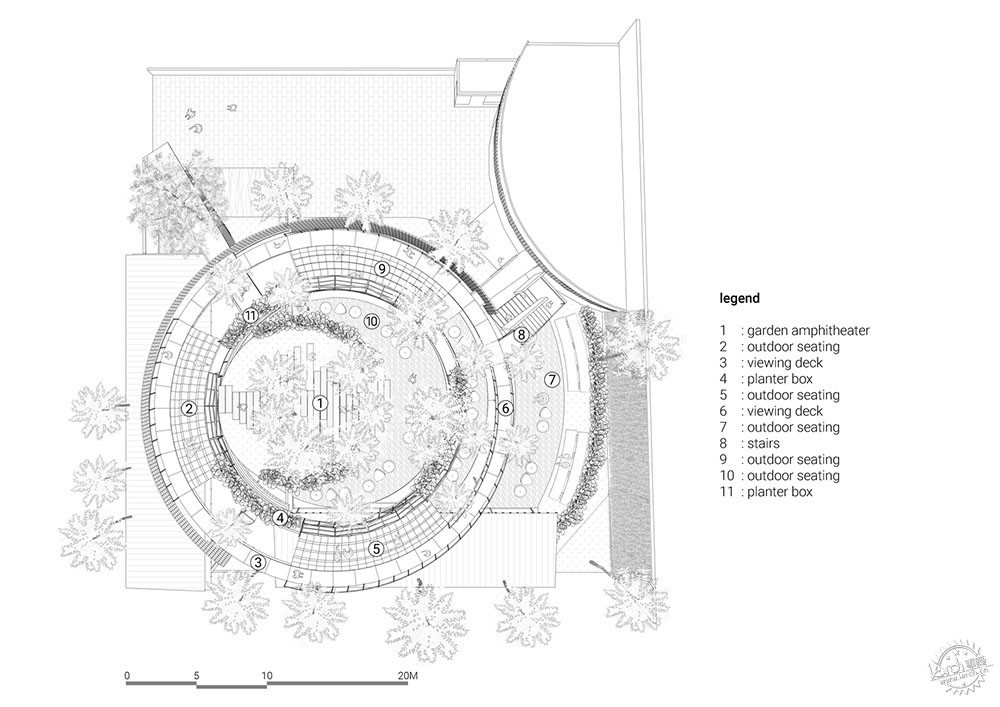

这是一个实验性的项目,旨在观察一旦建筑师重构空间制度之后,使用者的表现情况。RAD+ar工作室利用这个项目观察当人们身处不理解的空间时,他们会如何定义和表现。这也是咖啡厅里大部分的家具都没有明确的定义的原因,它们往往消融于精装和景观环境中。这样一来,使用者就可以按照自己对舒适的定义来使用这些家具。某种程度上这也是一项社会实验,研究人们如何在诸如花园等开放空间中不断重新定义自己对第三空间的感觉,这种感觉甚至会随着一天中不同时间的来访人群而改变。
It was designed as experimental programming to see and learn how users will behave once the architect restructures the hierarchy of space. RAD+ar uses this project to learn more about visitor behavior in defining spaces they don’t understand, that is why most of the furniture in this café is undefined, blended with the hardscape and feature of the landscape, therefore acting as an experiment of how visitor/user defines their own meaning of comfort in using this furniture. It was seen as a social experiment on how people keep redefining their sense of third space, in open space/garden and keep changing it to keep up with the crowds at different times of the day.
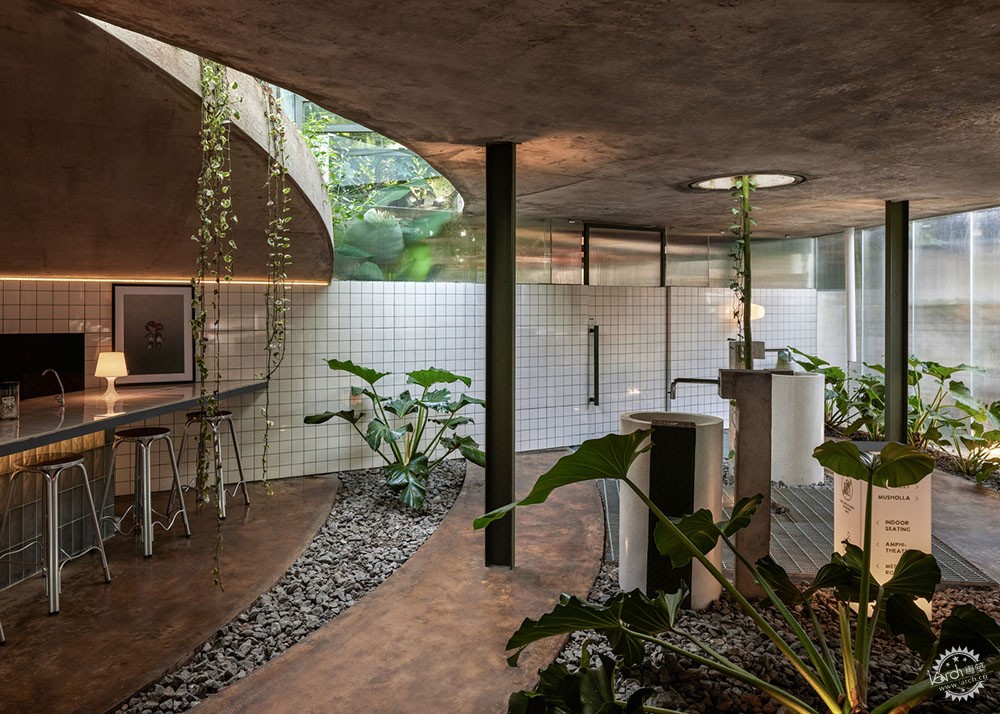
当游客进入环形花园,踏上两棵大树之间的连廊时,他们对室内外空间的定义变得模糊。进入这些空间后,看到花园里似乎被切开的天窗和其上人们的活动,人们往往会心一笑。同心圆的中间是咖啡吧,暗门背后分成两个空间,联系变少,更多的自然光倾泻而下。这两个空间的终点都指向花园,带领游客领会更多热带花园的乐趣。
As visitors enter the Ring Garden, they are surrounded pathway bridge that connects 2 existing trees that blurs the definition of indoor and outdoor space. Upon entering the spaces, they were teased by what appears to be sliced skylight and people activities in the garden above. Concentric space with a coffee bar in the middle, space branches into 2 spaces behind the concealed door that gradually become less intimate and flooded with more natural light penetrating. Both spaces are leading to the main spacious multi-leveled garden area as the ending and indirectly persuading visitors to enjoy more of what a tropical garden could be.
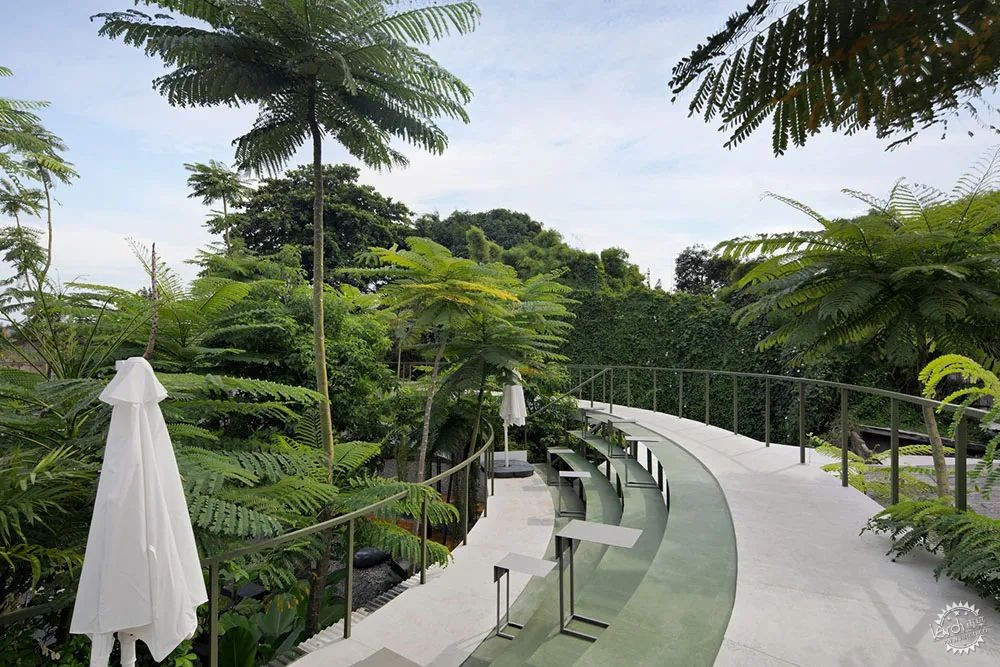
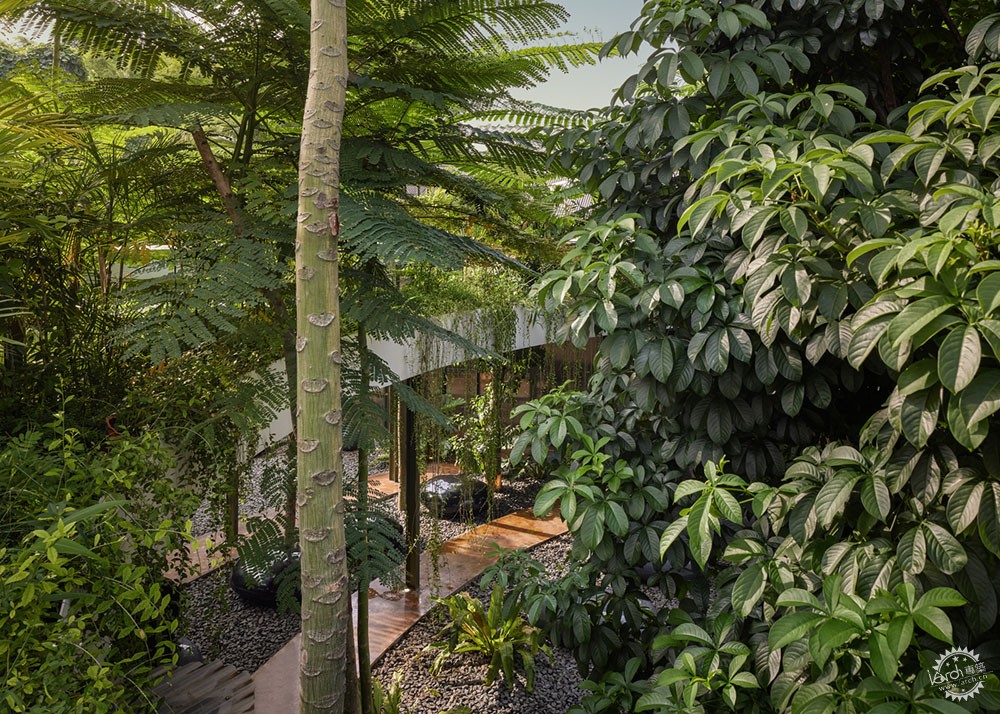
从更高的地方俯瞰,整个环形花园可以看作是城市与景观之间的过渡空间。眺望远处,天际线般的城市形象没入地平线,而进入花园广场的一瞬,色彩和光线以感性的方式将游客带入自然景观中。
In the upper level, the whole ring garden can be seen as a transitional space between the city and the landscape. Looking at the sculpture from further away, it punctures a skyline-like image of a city onto the horizon, but when entering the square, the color and light, invite the visitors in a sensual way into the natural landscape of the Ring Garden.
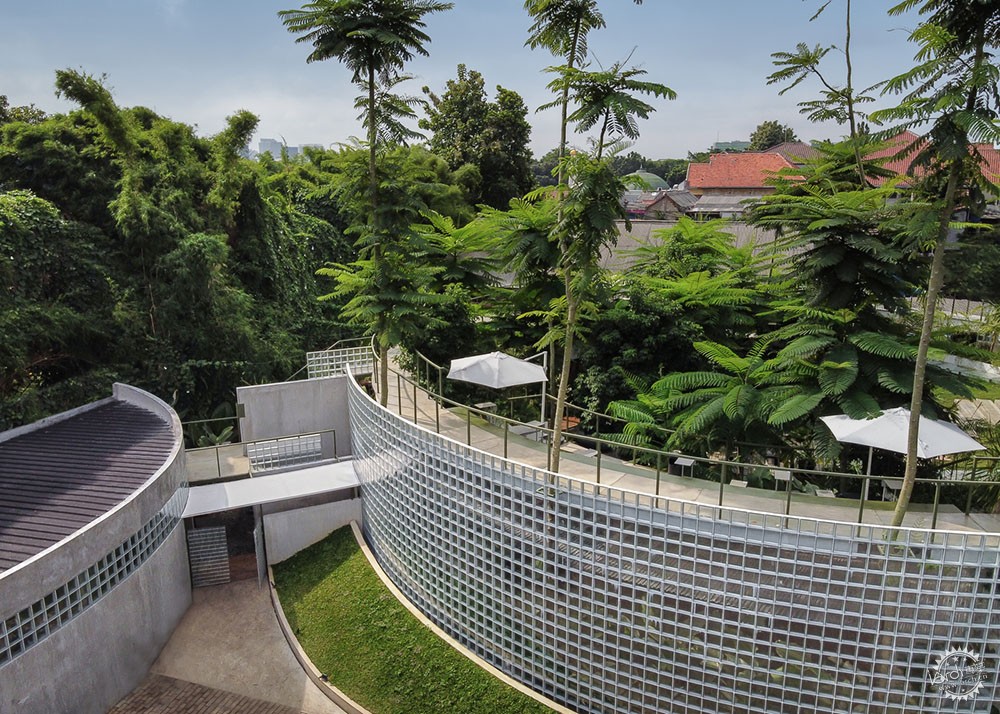
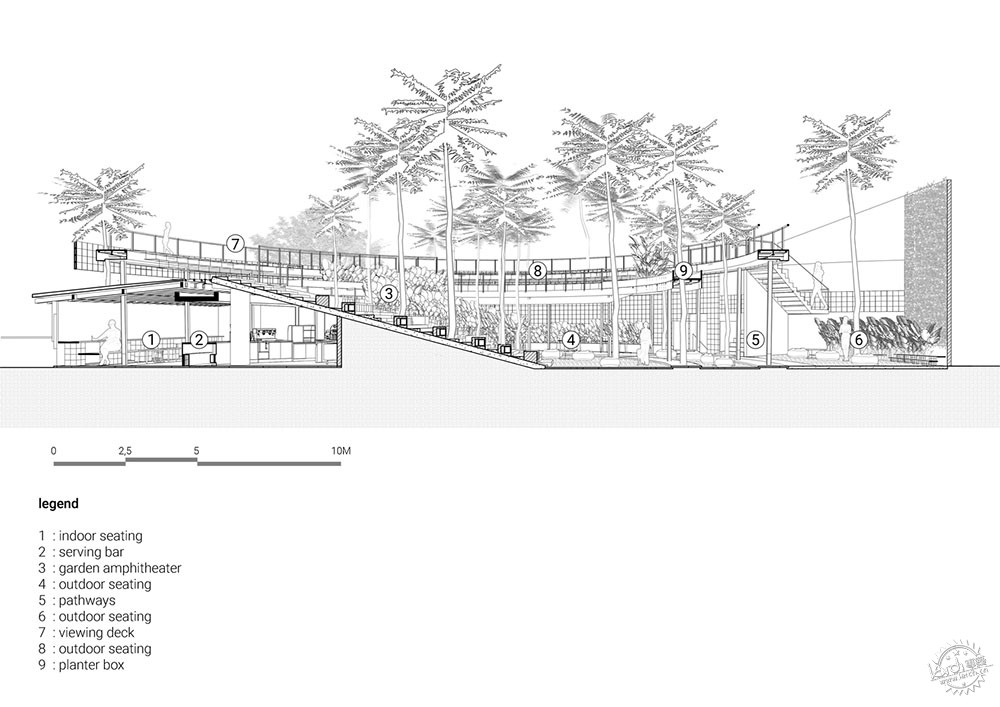

玻璃砌块是外壳的首选材料,因为它模糊了建筑物与花园的隐喻定义,保护了内部使用者的隐私,同时提供了充沛的内部自然光。为了保证轻盈感,墙体的结构藏在玻璃砌块中,彷佛厚重的材料漂浮在花园之上,并慢慢散落各处。
Glass block is chosen as the main materials for the envelope, as it is blurring the definition of whether or not this is considered a building / a garden metaphorically, buffering privacy of customer inside, while offering plenty of natural light from inside. The structure of the walls is integrated within the glass block to ensure its lightness, giving a sensation of very heavy materials were floating above the garden and slowly scattered along with the experience within.
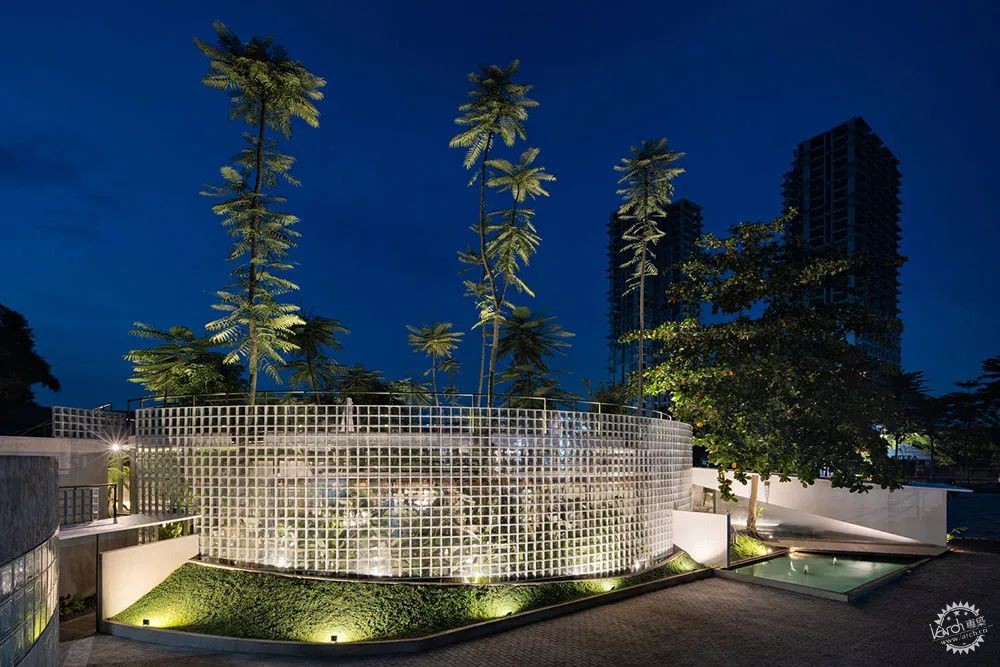
RAD+ar工作室将Covid-19看作是促进更多可持续热带商业空间的机遇之窗,并希望借此激励更多人参与,令资本主义可持续发展在像印度尼西亚这样具有发展中国家意识的国家也可以积极发挥作用。
RAD+ar saw the covid-19 pandemic event as a small window of opportunity to promote more sustainable means of outdoor tropical commercial spaces that hopefully can inspire many others to follow. It is a gesture of unwavering optimism on how to make capitalism- sustainability works in developing-country-minded like Indonesia.
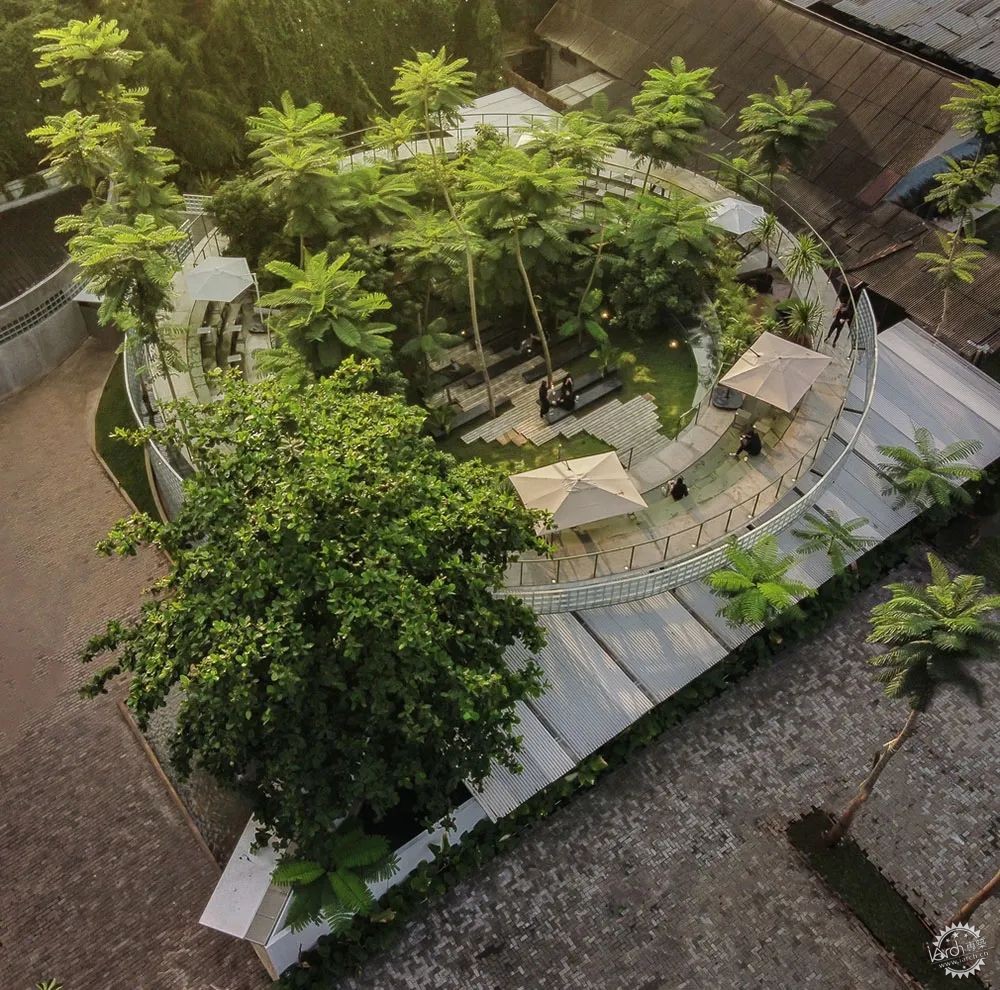
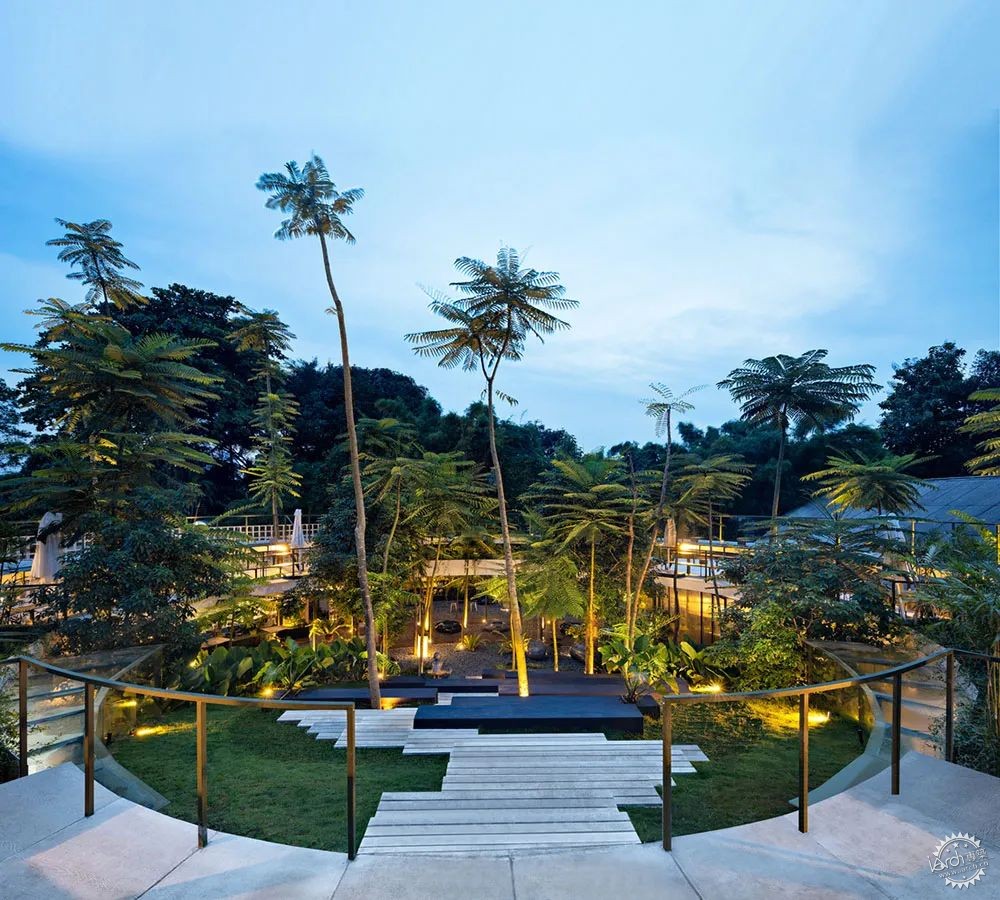

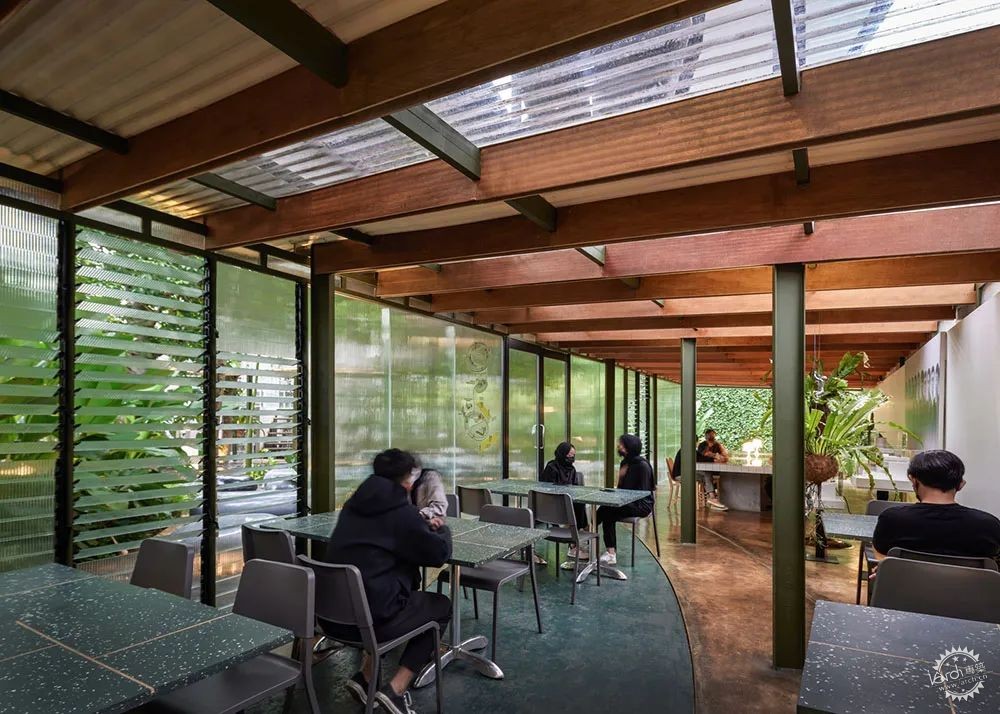
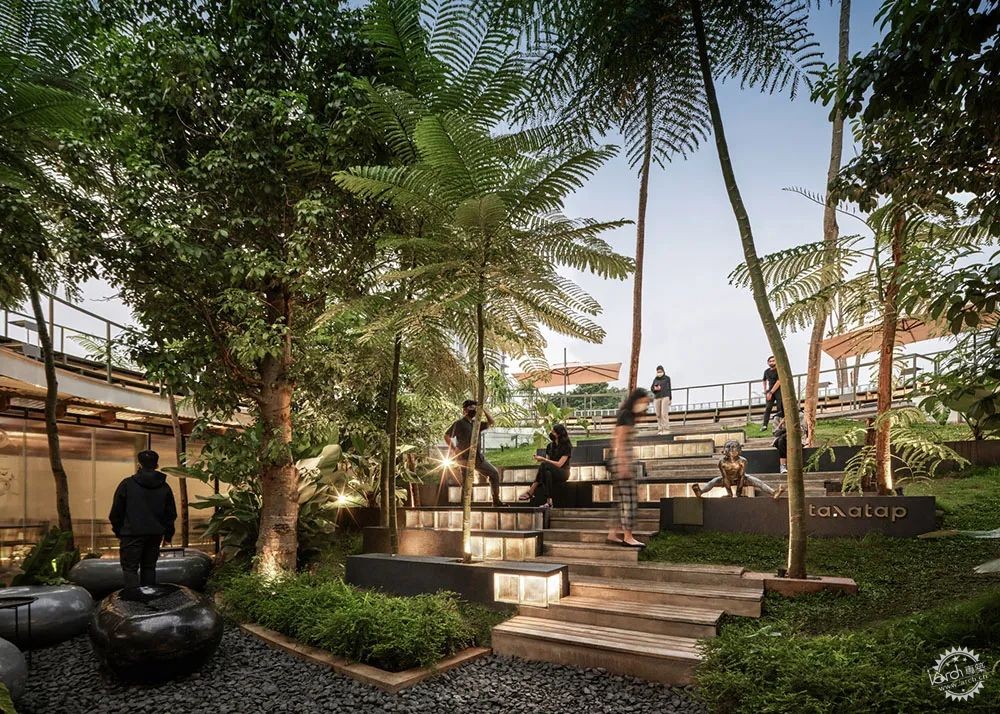
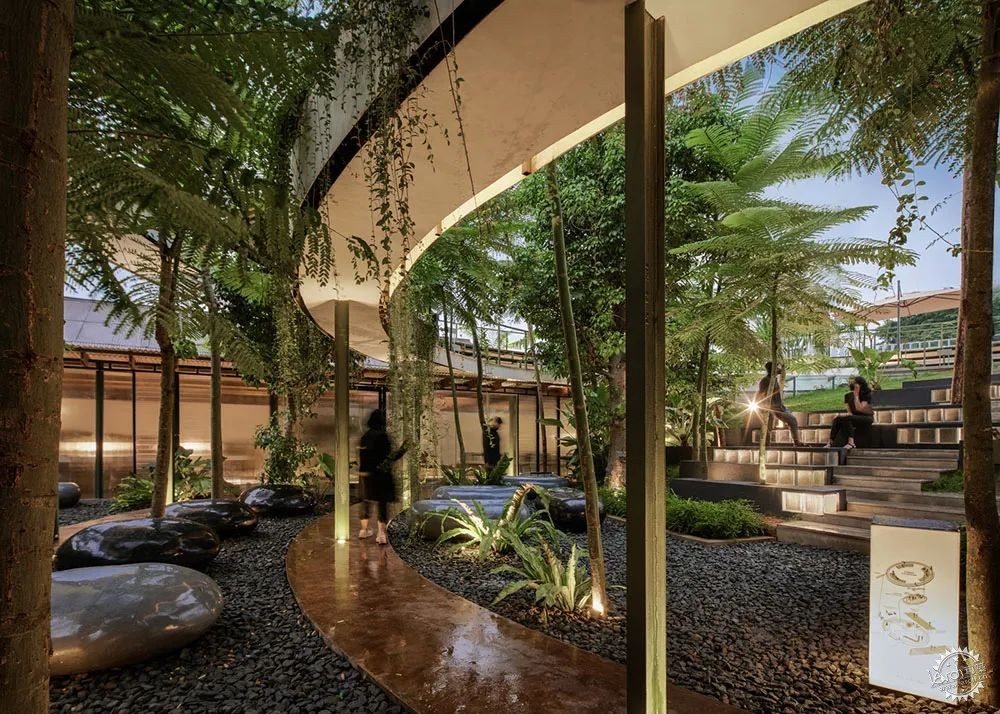
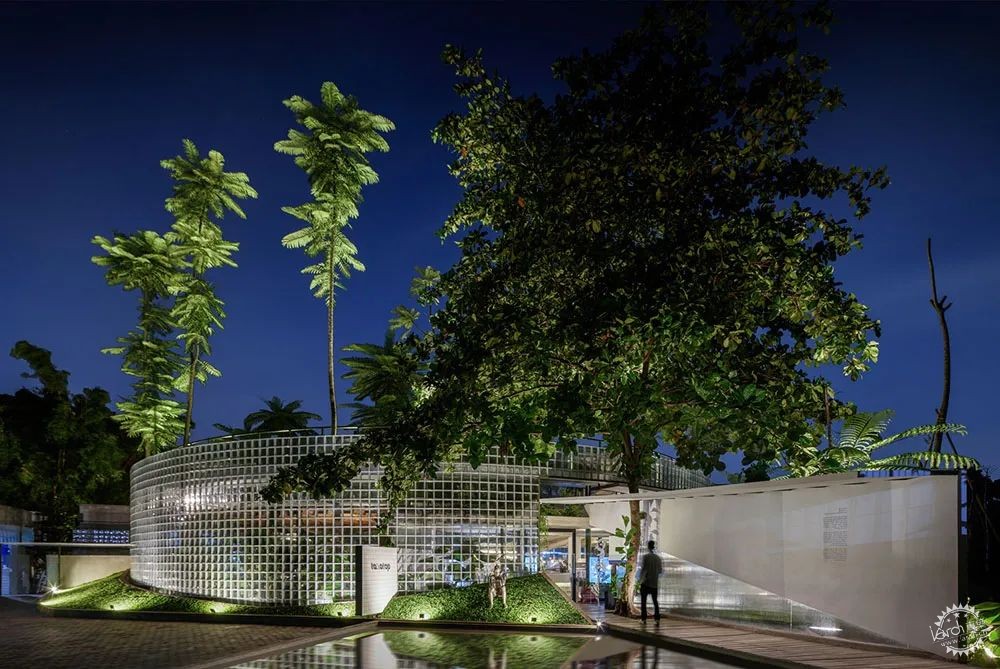
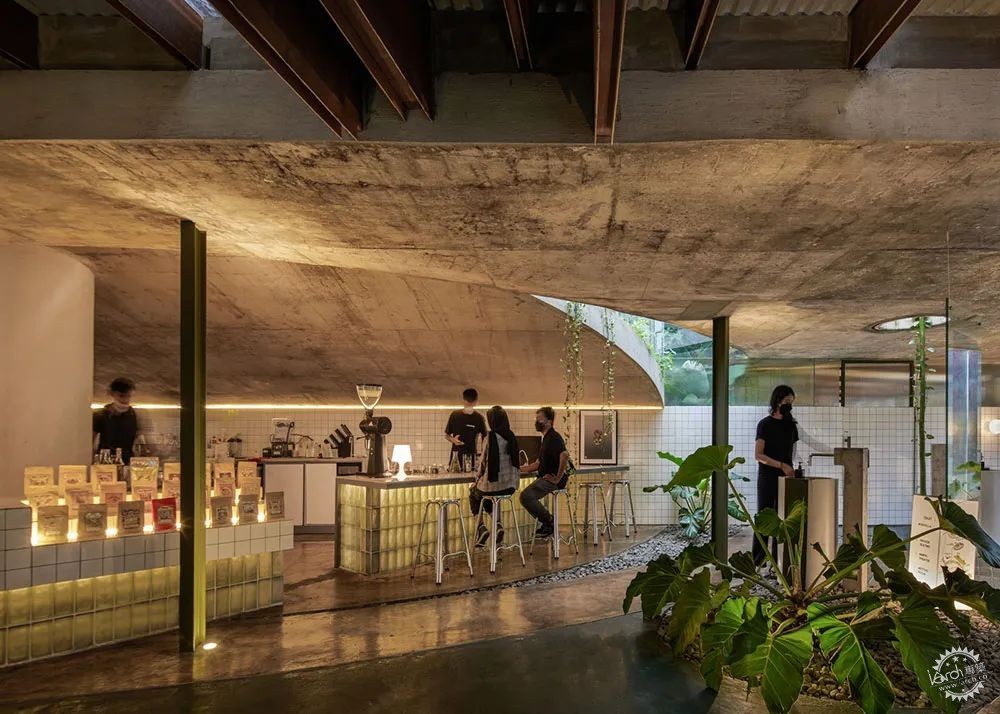
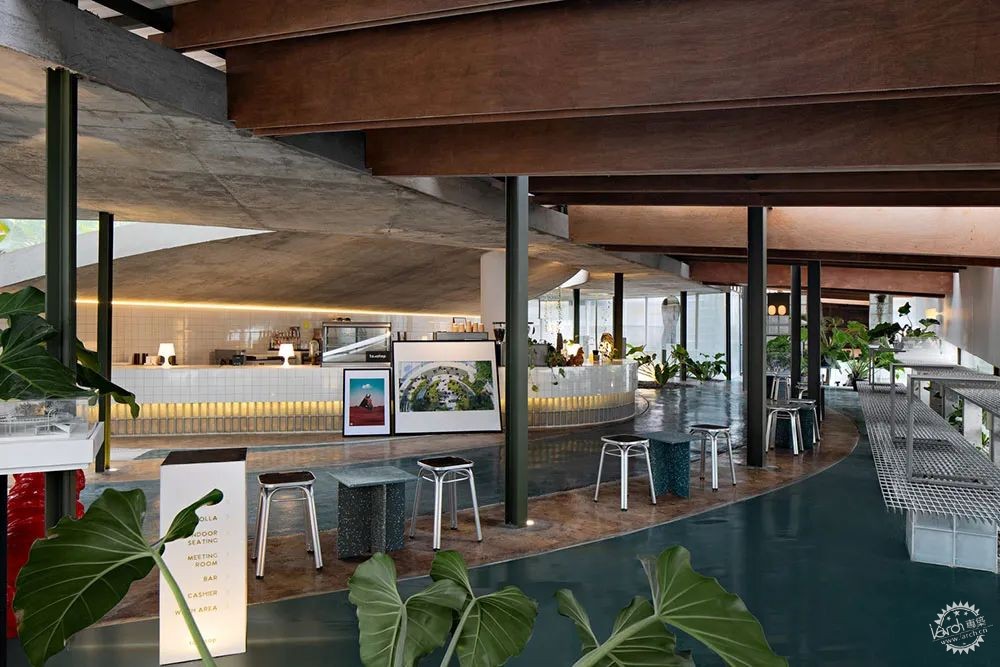
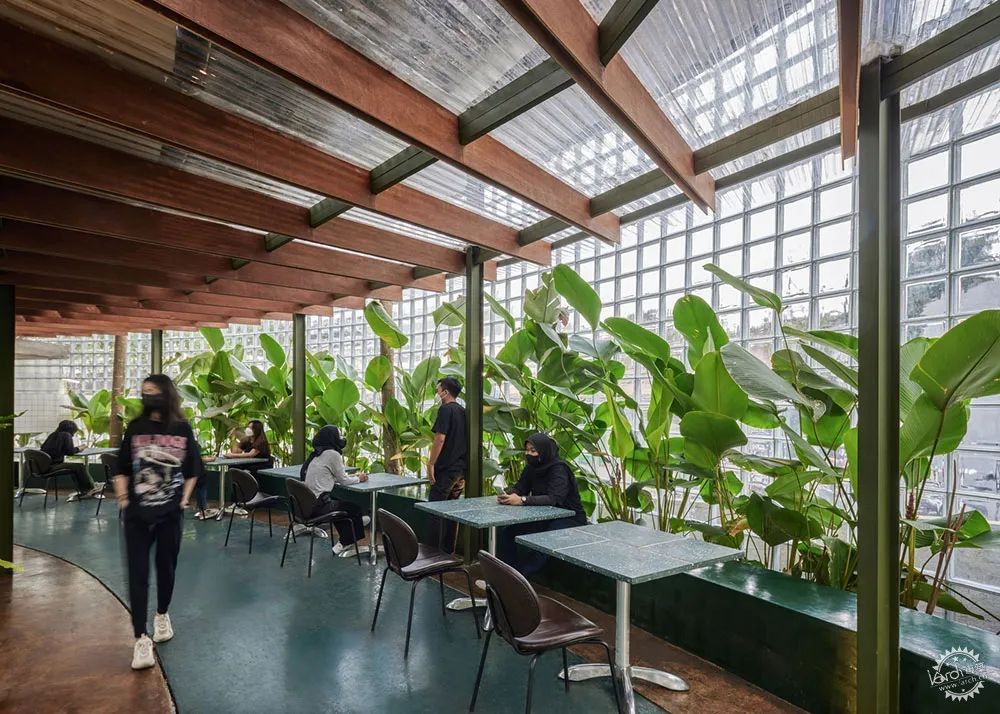
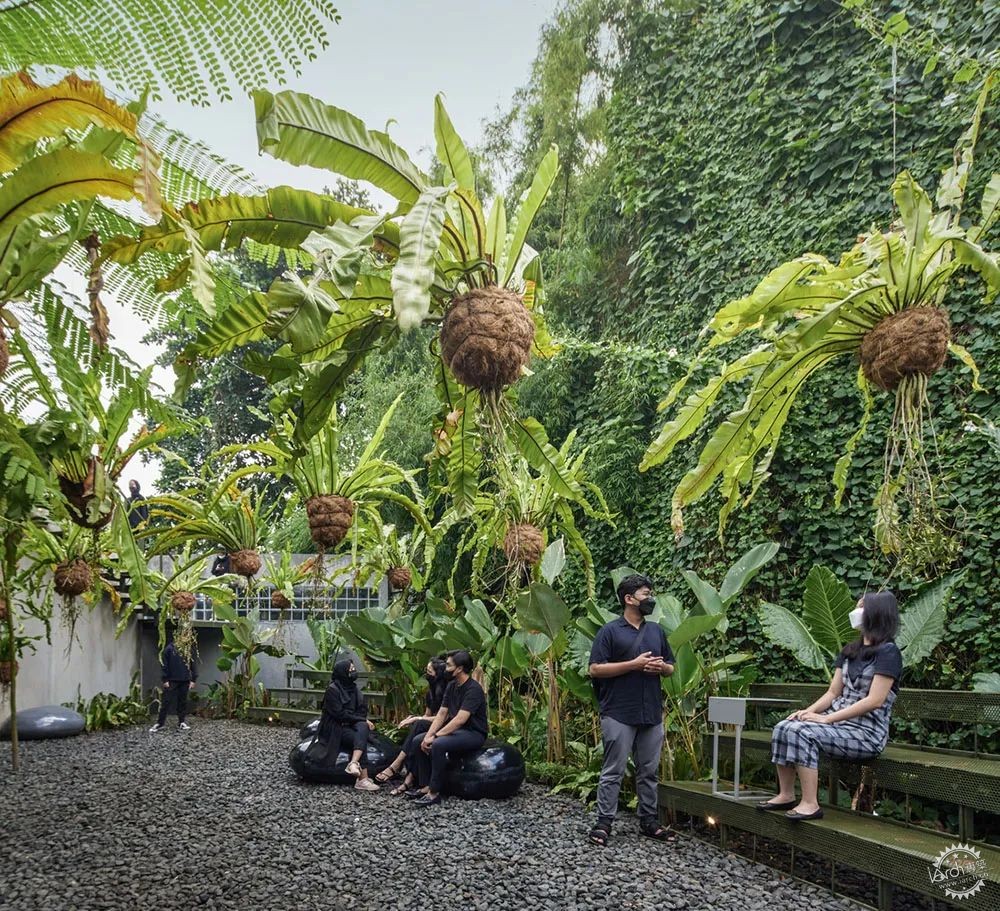
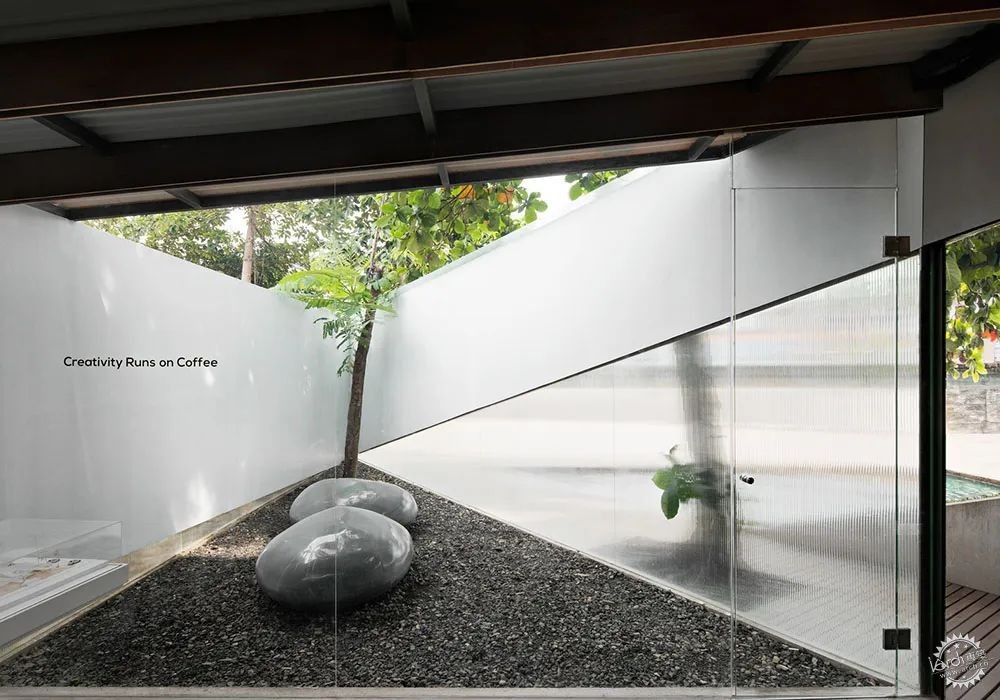
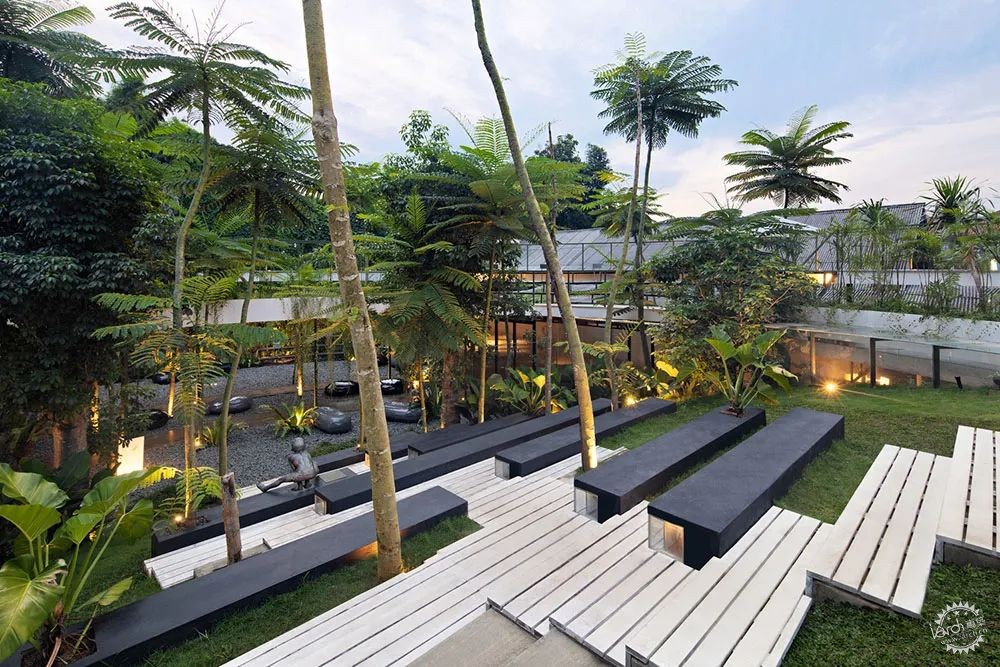
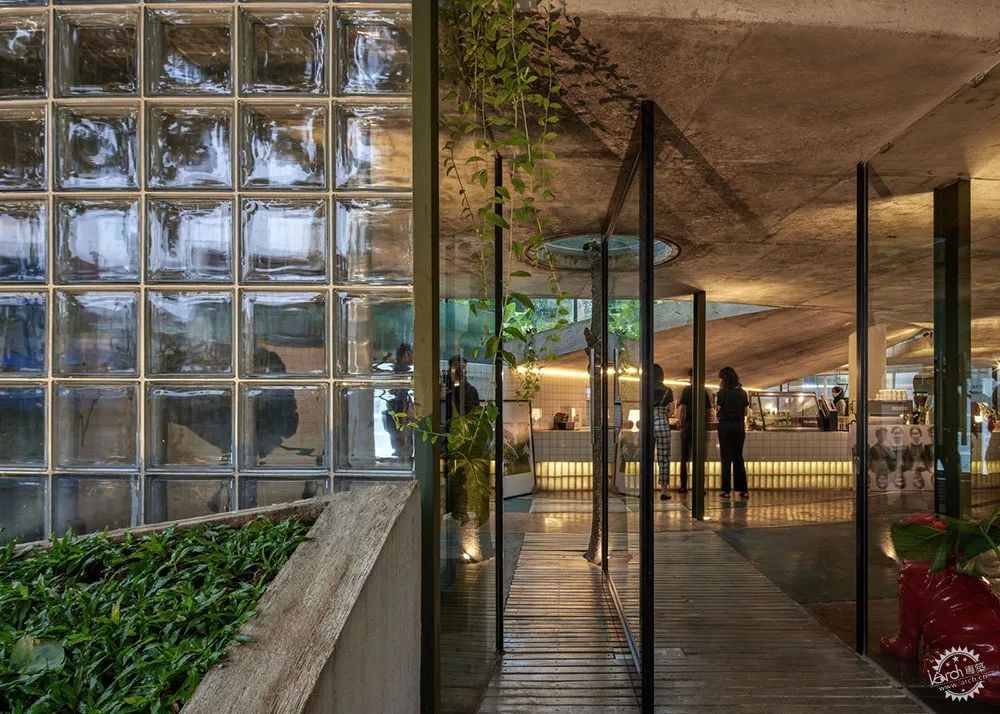
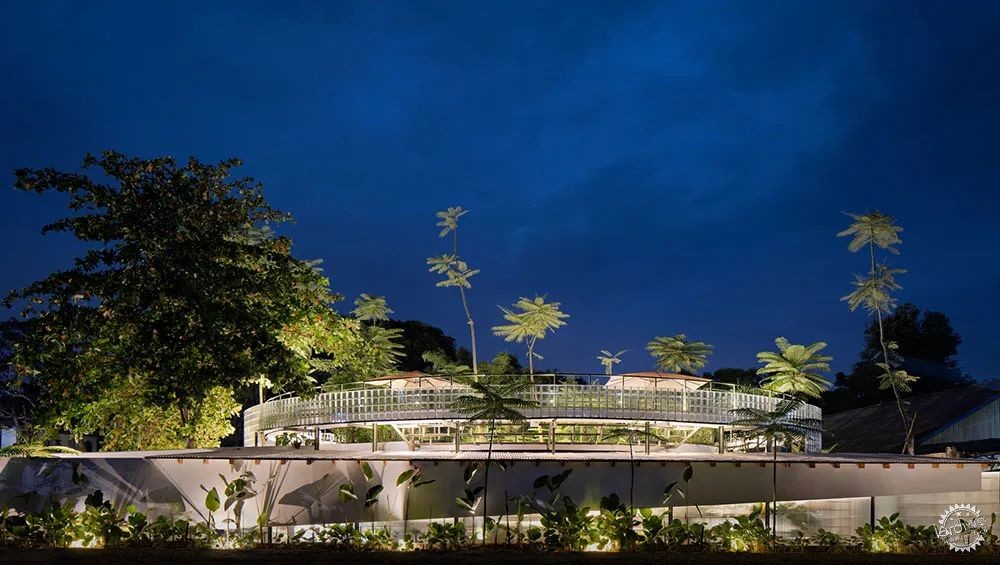
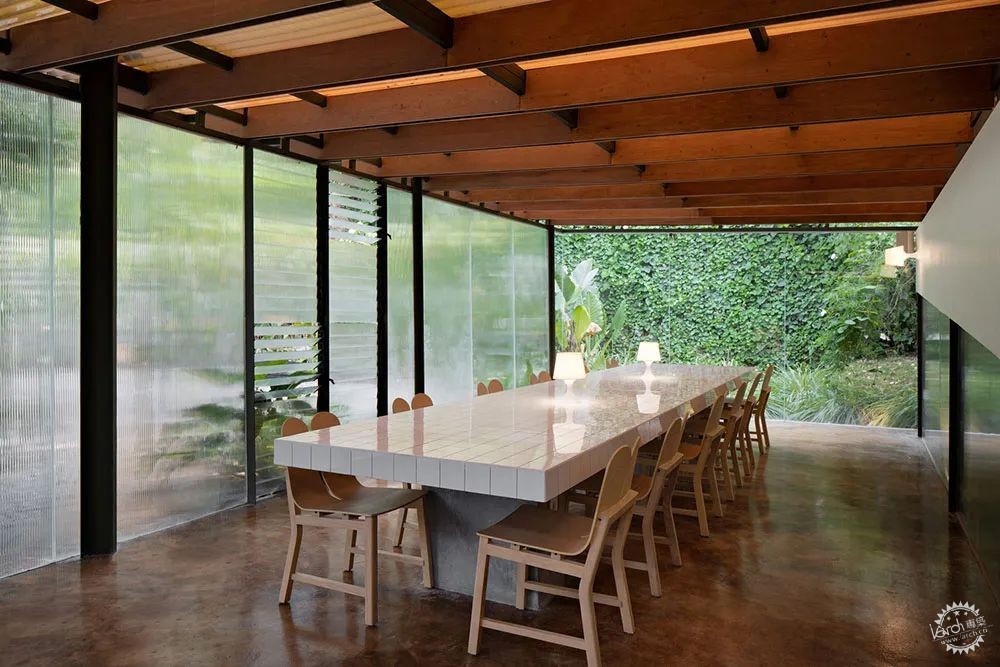
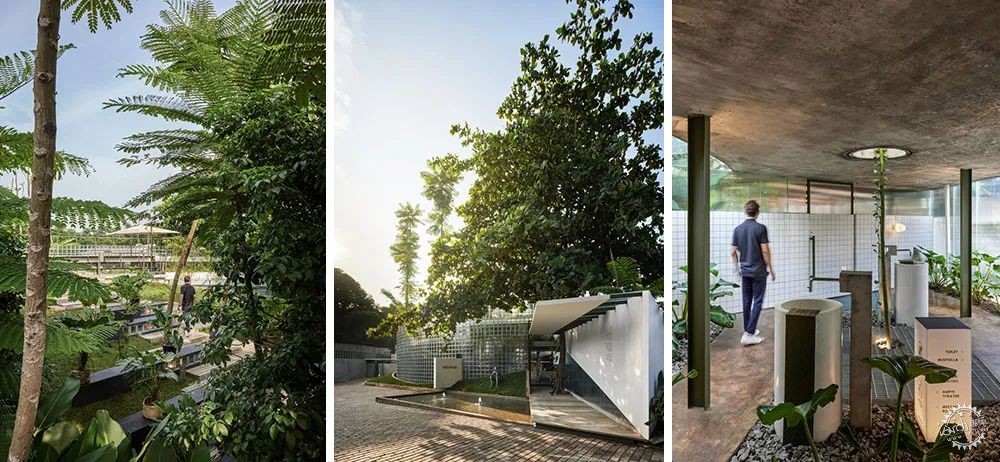
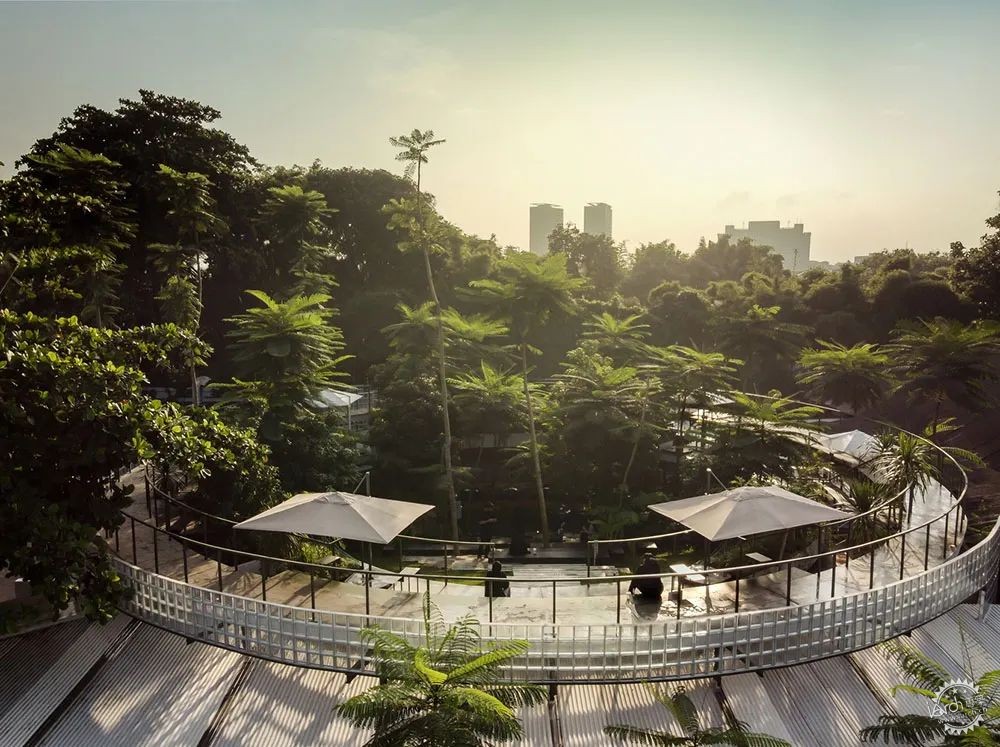

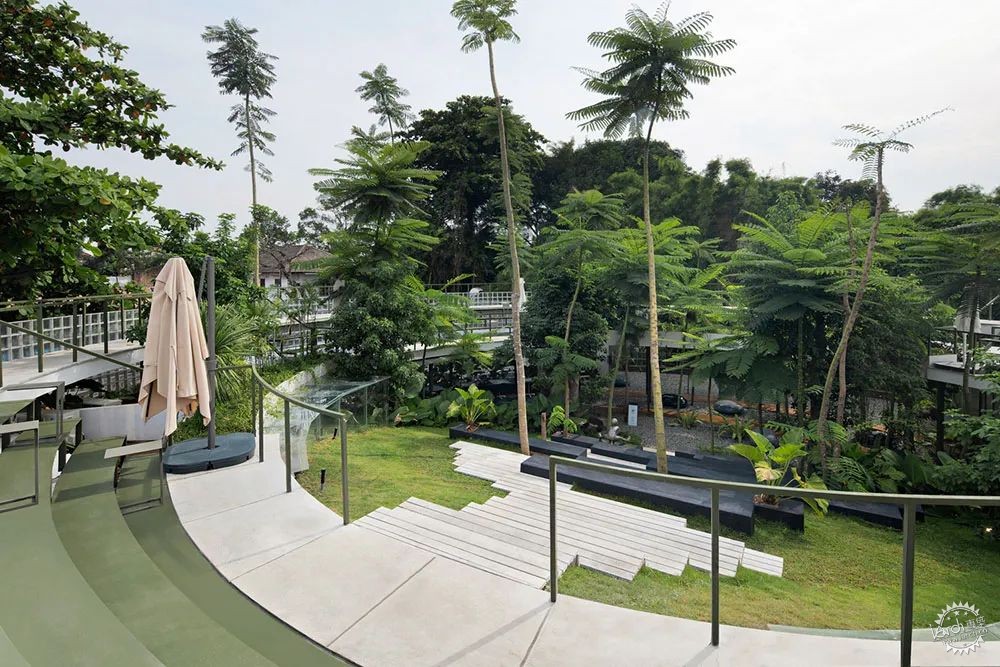
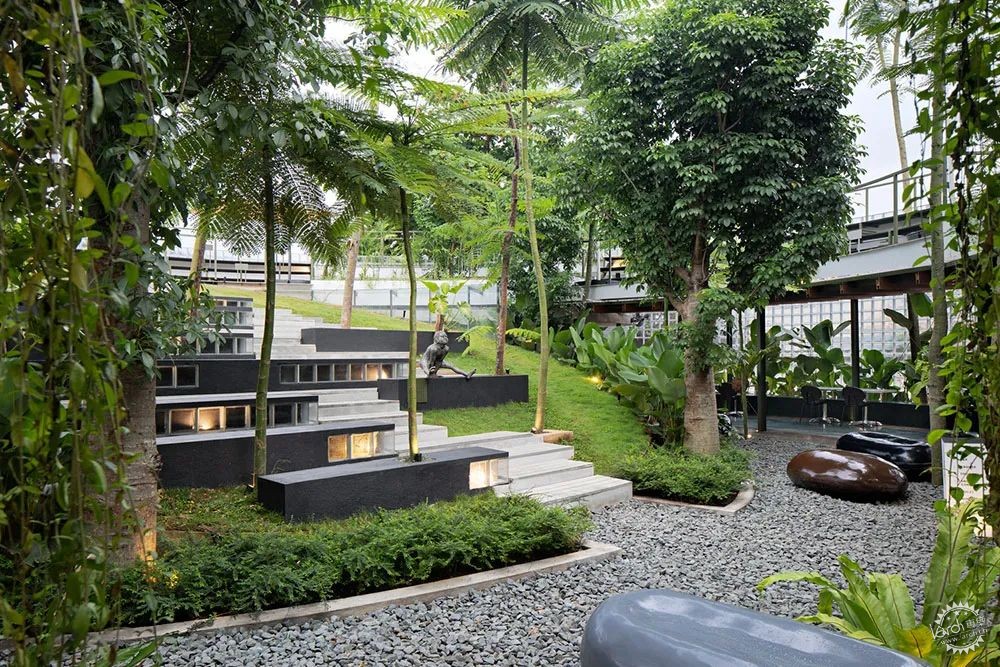
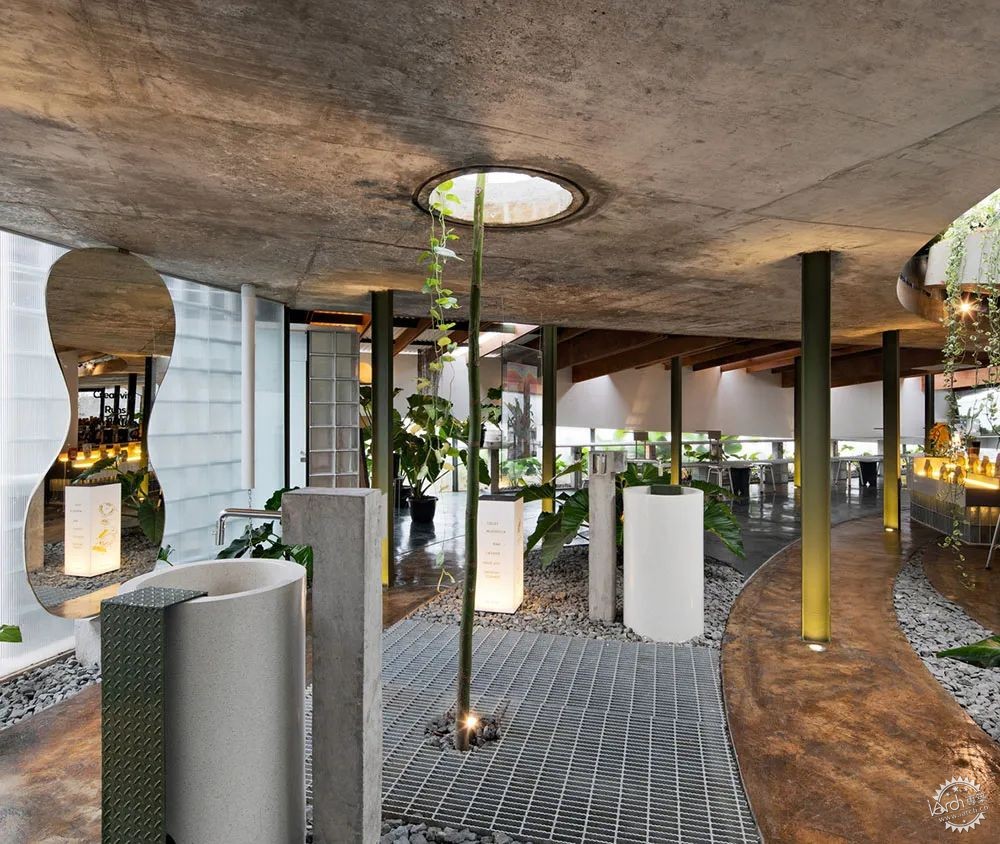


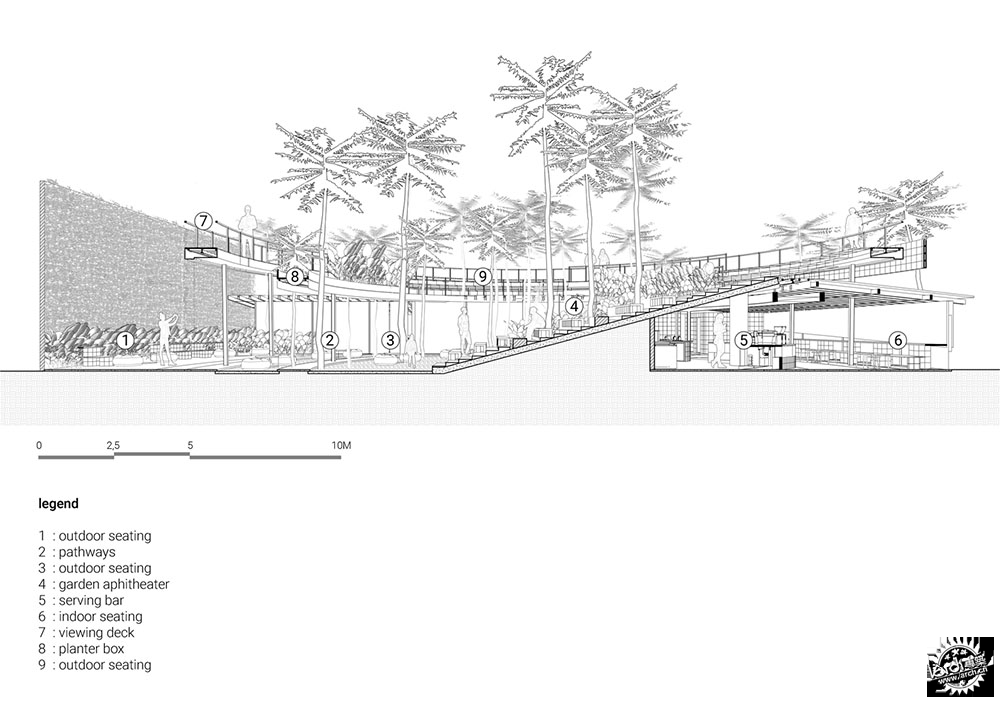

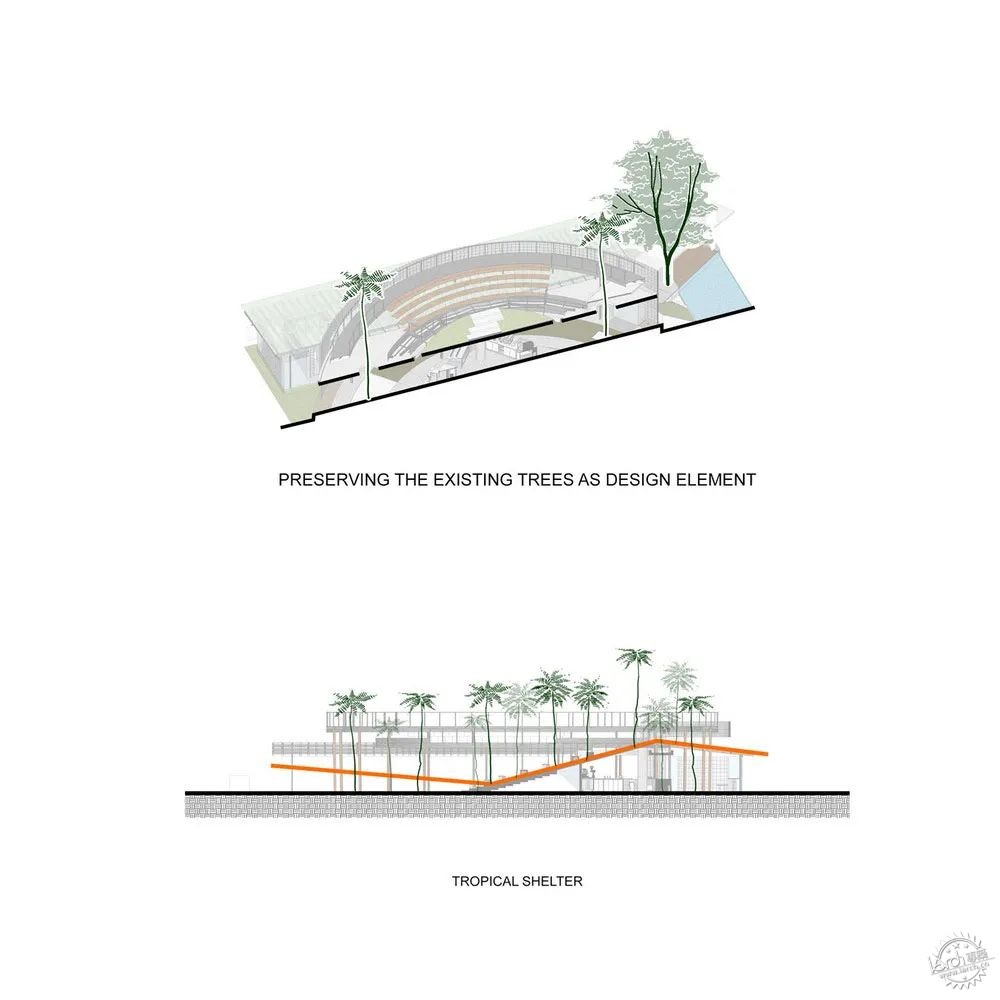
建筑设计:RAD+ar (Research Artistic Design + architecture)
类型:咖啡厅/商业建筑
面积 : 750 m2
年份 : 2021年
摄影:KIE, Mario Wibowo
制造商:Toto, Conwood, Mulia
主创建筑师:Antonius Richard Rusli
设计团队:Felda Zakri, Partogi Pandiangan, Leviandri, Alifi Muhammad Arief
建筑设计:RAD+ar (Research Artistic Design + architecture)
城市:雅加达
国家:印度尼西亚
COFFEE SHOP, COMMERCIAL ARCHITECTURE, JAKARTA, INDONESIA
Architects: RAD+ar (Research Artistic Design + architecture)
Area: 750 m2
Year: 2021
Photographs: KIE, Mario Wibowo
Manufacturers: Toto, Conwood, Mulia
Lead Architect: Antonius Richard Rusli
Design Team: Felda Zakri, Partogi Pandiangan, Leviandri, Alifi Muhammad Arief
Architects: RAD+ar (Research Artistic Design + architecture)
City: Jakarta
Country: Indonesia
|
|
